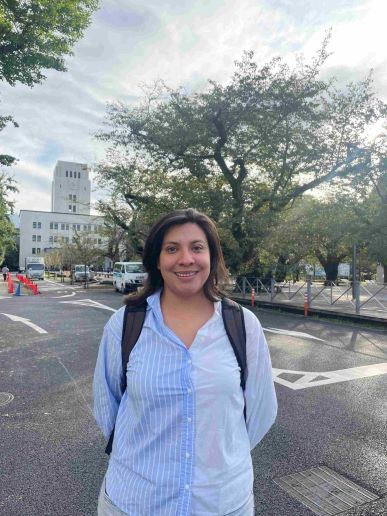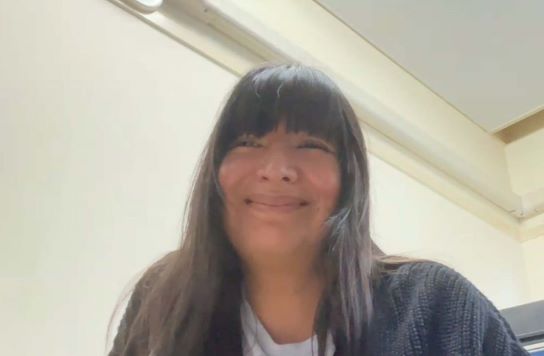【Interview】 From Bolivia and Guatemala to Japan, Learning experience on the other side of the earth
2024.12.04
The Latin America Department is currently accepting two university students in Japan through the 2024 JICA Internship Program. This time, one of our interns conducted interview to participants from Central and Latin America who have come to Japan through the JICA program (*1) and asked about their experience in Japan!
Hello everyone! My name is Gesi Tan from the School of International Liberal Studies at Waseda University. During my study abroad, I was deeply moved by the warmth and beautiful culture of the Latin America through sightseeing in Mexico and interacting with friends from Latin America, which eventually motivated me to do the internship at the Latin America Department. This time, I conducted interview with two participants from Guatemala and Bolivia who are currently studying in Japan for the SDGs Global Leader Course!
1st Interviewee: Karen Cifuentes (Guatemala)
School of Environment and Society, Institute of Science Tokyo
Ms. Cifuentes used to work in Guatemala as an architect, specialized in BIM (Building Information Modeling) technology in the private sector.

2nd Interviewee: Micaela Alvarez (Bolivia)
Institute of Urban Innovation, Yokohama National University.
Ms. Alvarez was as working as a public servant in Bolivia, particularly involved in public transportation planning, but now working as a freelance specializing in transportation planning.

★Motivation and Research ★
What motivated you to join the SDGs Global Leader Course and what is your research about?
- Karen san
My interest in this training program was influenced by JICA volunteer in Guatemala and inspired by my experience visiting Japan as a tourist, where I witnessed the blending of historical building and the modern cities. I am currently studying the conservation and reuse of historical heritage at the Institute of Science Tokyo. I am hoping to contribute to the urban development in Guatemala City by preserving cultural heritage while fulfilling social needs.
-Micaela san
I learned about JICA’s cooperation projects in Bolivia while I was working as a public servant. I had also visited Japan as a tourist before, so when the JICA staff member introduced me this training program, I decided to participate. Now, I am studying public transportation planning technology at Yokohama National University. My focus is to apply Japanese technology, such as economic benefits from the stations and on-time operation to different local conditions.
-Tan (intern)
I am surprised how both of you had prior experience with JICA in your home country! I am also glad to hear that you were interested in Japan even before the program and visited as tourists. As this is not your first time in Japan, I imagine you might have distinct experience as a tourist and as a student.
★Experience as a student in Japan★
After living in Japan, have you noticed any differences from the experience of being a tourist?
-Karen san
I did not feel any differences in particular. Japanese people are kind and polite, and even if my Japanese isn’t perfect, it’s been a great opportunity to practice speaking. However, it was a little challenging to find medicines that I used in Guatemala. Also, since my research is on an individual basis, there are few opportunities to interact with lab members, and I personally felt that people seem to have little interest in getting in touch with others, so making Japanese friends feels difficult.
-Micaela san
When it comes to living in Japan, I realize how heavy the paperwork is for things like housing and utilities. Not only the complex process, but the language barrier also made things more challenging. Another observation is that Japanese people seem to prefer being alone. I was surprised to find that cafes and restaurants have individual sitting areas, because in Latin America, it is more common to eat out with friends or family. I wish there are more opportunities to connect and interact with people in Japan.
-Tan (intern)
It is interesting to see how both of you had the same feeling that there are little opportunities to interact with Japanese people. Although there could be a language barrier, cultural differences could also be a reason, in which in Latin America, interaction among people appears to be more casual and sociable.
★Career after training in Japan★
After completing your training in Japan, what career path do you have in mind?
-Karen san
For now, I am thinking of working at Guatemalan branch of DOCOMOMO international (*2), which is an international non-profit organization from the Netherlands, and engage with heritage conservation in Guatemala City. As a member of the organization, I am aiming to influence the government’s urban development policy and shift their focus from building new construction to effectively reusing existing architecture.
-Micaela san
The research of transportation engineering, which is my major, is more advanced outside of Bolivia. Therefore, at this point, I am planning to gain further experience in other countries and improve my skills before returning to Bolivia. Eventually, I am hoping to apply my knowledge and contribute to the development of transportation back home one day.
-Tan (intern)
I am truly hoping that your learning in Japan would be a great advance towards your next career!
★Experience with JICA★
Karen san, you mentioned how meeting JICA volunteer in Guatemala had influence on your decision to join this program. How do you feel about the program now that you have participated?
-Karen san
JICA offers a lot of support with wide range of events and internship opportunities for trainees, which are useful not only for experiencing Japanese culture but also for networking. In addition to the training inside of Japan, JICA also provides generous support for learning opportunities outside of the university, such as academic conferences, which encourages us to gain a variety of experiences.
-Tan (intern)
It is great to hear that JICA has been supportive in both academic and daily life. I believe it is reassuring to have such a supporting system while studying abroad!
★Uniqueness of transportation system in Japan★
Micaela san, since you are studying urban transportation development, what do you think about Japan’s public transportation?
-Micaela san
Japan's public transportation systems are impressive in terms of planning and operation. It is not merely about building transportation where they are needed, but for a sustainable operation, planning stations to create economic benefits is also an essential factor to consider. In addition, punctuality of the transportation would not only bring convenience but also contribute to creating a higher quality of life. It’s been a valuable learning experience for me.
-Tan (intern)
I feel relatable to your point! Remember when I was in Mexico, I had to change my plans several times because the buses did not arrive on time. It made me realize how much I took punctual transport system in Japan for granted.
Karen san and Micaela san, thank you so much for your time and cooperation in this interview!
【After the interview】
While Karen san and Micaela san had expressed their puzzled feeling to cultural differences, they also shared how much they are able to learn and how comfortable they feel about living in Japan. Micaela san mentioned that she would like to bring desserts in Japan back to Bolivia! Living in a foreign country could face lots of challenges, not only in terms of language but also in adjusting to different customs. However, it was inspiring to see how participants, with different goals, come to Japan and dedicating themselves for their research and studies. This interview provided not only a great opportunity to learn about JICA training program but also new perspective and insights to the participants’ individual stories.
(*1):SDGs Global Leaders Course
(*2): 「do_co,mo.mo_」 An international organization for the research and preservation of records of buildings and environmental formations related to the Modern Movement. Docomomo International – Architecture Archive)
scroll